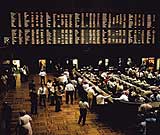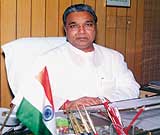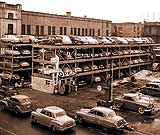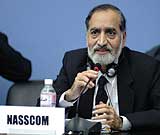|
A
MOTLEY COLLECTION OF BUSINESS AND ECONOMIC NEWS |
|

|
|
FOREIGN DIRECT INVESTMENTS
|
FDI floodgates to open in July
In a month from now, a host of sectors are expected to be opened up for greater foreign investment and that includes areas as diverse as mining for titanium—hitherto reserved for atomic energy use—to select segments of retail trading, aviation and oil refining.
But the biggest change could be in aviation where a section within the government is pushing for allowing foreign carriers to acquire stake in local airlines— a suggestion which may not go down well with some of the existing players.
There are a host of other sectors related to the civil aviation business where the rules of the game are proposed to be eased. The list includes ground handling, maintenance and repair and air charter services, where up to 100% foreign investment is expected to be permitted, as against 49% at present.
The Centre was also expected to finalise the guidelines for allowing up to 49% in commodity exchanges a move which could see a rush of global investors in the business that has already seen the likes of Goldman Sachs and Fidelity acquire stakes in MCX and NCDEX.
In addition, government is expected raise the FDI cap for petroleum refining from 26% at present to 49%. As a precursor, the cabinet recently cleared Laxmi Mittal's proposal to acquire 49% stake in Hindustan Petroleum's Bathinda refinery as a one-off case.
The commerce ministry is trying to build consensus on its proposal to permit specialised retailers set up stores in India that deal only in electronics or sports goods and permit the foreign players to hold up to 51% stake.
“We are receiving suggestions from various ministries and exchanging notes. The cabinet note has not been finalised yet,” said an official.
|
|
|
| STAINLESS STEEL |
 New billion-dollar babies on the bourses New billion-dollar babies on the bourses
Twenty companies have joined the elite billion-dollar-market-cap club so far in 2007, with the appreciating rupee emerging as a major driving force behind this.
Among the new entrants are: Praj Industries, Syndicate Bank, Andhra Bank, Wockhardt, Reliance Natural, Essar Steel, Biocon, Deccan Chronicle, Max India, TV 18 India, Yes Bank and HT Media.
Tata Tea, Titan Industries, Areva T&D, Divi’s Lab, Moser Baer and Tata Teleservices have also joined this league. Idea Cellular, Cairn India, Power Finance Corporation, Indian Bank and Dish TV -which listed on the bourses this year -are also in.
The combined market value of all the billion-dollar firms today stands at $791 billion, representing a gain of $150 billion since the beginning of this year and a massive increase of $300 billion in the past one year. India Inc today boasts of 146 publicly traded companies with market capitalisation of over $1 billion, up from 126 at the end of 2006.
One year ago, there were just 98 companies in this club, which has expanded by 48 now, taking the combined market value of all listed companies in the country to a little below one trillion dollars. Among these, the dollar-market values of 25 companies have doubled since the beginning of 2007, while just 16 have seen a two-fold jump in their market capitalisation in rupee terms. In the past one year, since May 21, the market cap of 27 companies has doubled in dollar terms, while the rupee-market value of only 17 companies has witnessed a similar jump in the same period. The rupee has gained about 8% in 2007, and over 10% in the past one year.
|
|
|
| TELECOM |
 New Companies Act may clash with Sebi New Companies Act may clash with Sebi
The new Company Law is likely to notify the minimum number of independent directors on the board of a company at 33% of total the strength, instead of 50% as being enforced by the Securities and Exchange Board of India (Sebi) through its listing agreements under clause 49.
“I think the figure of one-third is sufficient,” minister of corporate affairs Prem Chand Gupta said on the sidelines of a seminar on accounting standards organised by Assocham.
The JJ Irani Committee, formed to suggest the framework of the new Company Law, had also recommended that the independent directors should constitute one-third of the board.
Interestingly, in the case of listed companies, the Sebi's rule that stipulates the minimum number of independent directors at 50% of the total board strength would prevail upon the Company Law's requirement of 33%. Sebi has aleready enforced the requirement for minimum number of independent directors on listed companies.
Gupta said Sebi is the regulator of listed companies only, while the law would deal with all companies. Moreover, he said the new Act is likely to decide in favour of 33% after consultation with companies.
And if they favour 33%, government might suggest to keep the number of independent directors on the board at 33% of the total strength.
Gupta said the consolidated Company Bill, which is being formulated by the Law Ministry, would be introduced in the Winter Session.
|
|
|
Petro prices to stay
Union Minister for Petroleum Murli Deora has ruled out any immediate hike in prices of petroleum products including LPG and kerosene. The minister said the government and the oil companies had shared 87 per cent of the burden of under recoveries caused by the high oil prices last year. “As far as possible we will not increase prices of any products now,” he said adding that the price of PDS kerosene was not hiked in the last three years.
|
|
|
 DLF close to winning Rs 3,000 cr Delhi project DLF close to winning Rs 3,000 cr Delhi project
Real estate giant DLF appears close to bagging a Rs 3,000 crore convention centre project in the capital New Delhi, possibly the biggest in the country, as the company is the only bidder for developing the facility.
The 35-acre project that includes land cost and lease was offered for bidding by the Delhi Administrative Authority (DDA). DLF is the sole bidder virtually bagging the project at Dwarka.
A DDA spokesperson said that it has received only one bid for the convention centre project from DLF.
The authority was yet to decide on the outcome of the bidding price, the spokesperson said.
She said the bid was yet to be opened. If DLF wins this project, it would be the billion dollar company's first major deal after the public offer, which was the country's largest IPO of Rs 9,187 crore.
The convention centre project would comprise a conference hall spread over 72,000 sq ft with a seating capacity of 6,000.
It would also have one or two hotels with 800 rooms. Besides, it would have the largest retail mall in Dwarka and one million sq ft of commercial space.
|
|
|
|
DIGITAL TECHNOLOGY
|
 Kolkata firm to build parking lots in Delhi, Bangkok Kolkata firm to build parking lots in Delhi, Bangkok
Simplex Projects Limited, a Kolkata-based construction company which built the country's first automated parking system in the city, is to build hi-tech parking systems in Indian metros, including New Delhi and Bangkok.
Simplex, a company engaged in integrated engineering, procurement and construction services, built the automated parking system, Parkomat, in Kolkata a few years ago. The project has now drawn the attention of the Thai authorities.
“The Thai Counsel General here was very happy with our project and asked us if we would be interested in building similar parking systems in their country. We have given a presentation already and it would be quite an achievement that an Indian company would build parking systems in a modern city like Bangkok,” B.K. Mundhra, managing director, Simplex said.
He said new parking systems would be a huge business in India in the next five years and the Rs 1.35 billion company hopes to cash in on the trend. Simplex is coming out with a public issue soon.
“In the next five years, the parking business would be Rs 50 billion in India. At least 15 modern parking lots for 7,000 cars are coming up in New Delhi alone.
|
|
|
 Banking sector spends most on infotech: Nasscom Banking sector spends most on infotech: Nasscom
The banking and finance sector was the highest average spender on IT services in 2006 and is expected to retain the edge this year as well, according to a Nasscom survey.
The finance sector was followed by the energy and utility segment. The rate of increase in average spending in each of these verticals is expected to be in the range of 12-27%, making them the most likely highest spending sectors in 2007 as well.
A third sector—tourism and hospitality—is projected to witness a considerable hike in its IT spend. Its total Rs 18 crore spend last year is projected to witness a 13% growth, placing it among the highest tech-spenders in India in 2007.
'Tracking of IT adoption study 2006' was released by Nasscom president Kiran Karnik. “The year 2006 was a great year for the domestic IT market which saw balanced growth across hardware, software and services segment”, he said. However, Karnik cautioned that the profitability of IT companies will be affected by the recent appreciation of the rupee against the dollar and needs to be checked in time.
|
|
|
|
|
|
|
|
|
July 2007
|
|


|
|
|
|